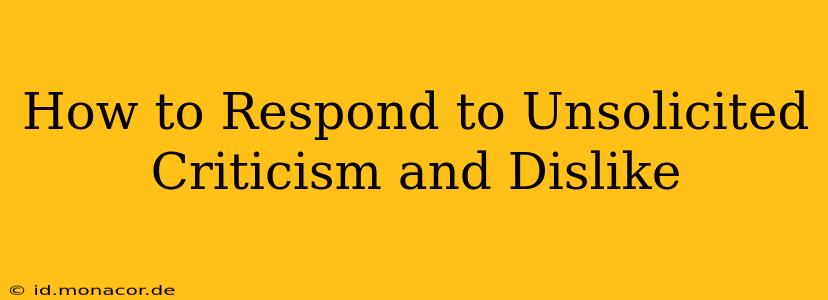How to Respond to Unsolicited Criticism and Dislike
Unsolicited criticism and dislike can sting, whether it's a harsh review of your work, a negative comment online, or a pointed remark from a colleague. Learning how to navigate these situations gracefully and constructively is a crucial life skill. This guide provides strategies for responding effectively, fostering resilience, and even turning negative feedback into a positive learning experience.
Why Do People Offer Unsolicited Criticism?
Before diving into how to respond, it's helpful to understand the motivations behind unsolicited criticism. Sometimes, it stems from genuine concern, a desire to help, or even a misguided attempt at connection. Other times, it's rooted in negativity, envy, or a need to exert control. Understanding the potential motivations doesn't excuse the behavior, but it can help you approach the situation with more empathy (or less emotional investment, depending on the context).
What are the best ways to respond to unsolicited criticism?
This is a crucial question with no single "right" answer, as the optimal response depends heavily on the context: the relationship with the critic, the nature of the criticism, and your own emotional state. However, here are some general guidelines:
-
Acknowledge the Criticism (Without Validation): Start by acknowledging the person and their feedback. For example, "I appreciate you taking the time to share your thoughts." This doesn't mean you agree; it simply shows you're listening.
-
Assess the Validity: Is there any truth to the criticism? Can you learn anything from it? Separate valid points from personal attacks or irrelevant comments.
-
Consider Your Response: Do you need to respond at all? Sometimes, silence is the best response, particularly if the criticism is aggressive or unproductive.
-
Choose Your Words Carefully: If you do respond, choose your words carefully. Focus on facts and avoid emotional reactions. A calm, measured response is far more effective than a defensive or angry one.
-
Set Boundaries: It's perfectly acceptable (and often necessary) to set boundaries. For instance, you might say, "I understand your perspective, but I'm not comfortable discussing this further."
How do I deal with online criticism or dislike?
Online criticism presents unique challenges. The anonymity of the internet can embolden negativity, and the permanence of online content means harsh words can linger. Consider these strategies:
-
Don't Feed the Trolls: Ignoring negative comments is often the best approach. Engaging only fuels the fire and can escalate the situation.
-
Block and Report: If the comments are abusive, harassing, or violate community guidelines, block the user and report the content to the platform.
-
Focus on Positive Feedback: Remember that not everyone will appreciate your work, and that's okay. Concentrate on the positive feedback and support you receive.
-
Seek Support: If online criticism is impacting your mental health, reach out to friends, family, or a mental health professional.
How can I respond to unsolicited criticism from a friend or family member?
Criticism from loved ones can be particularly painful, as it often comes from a place of perceived closeness and concern. Here are some tips:
-
Open Communication: Try to understand their perspective. Ask them to explain their criticism more thoroughly.
-
Express Your Feelings: Communicate how their criticism makes you feel, using "I" statements. For instance, "I feel hurt when you criticize my choices."
-
Find Common Ground: Look for areas of agreement and work towards a resolution.
-
Seek Professional Help: If communication breaks down or the criticism becomes abusive, consider seeking therapy or counseling.
Is ignoring unsolicited criticism always the best response?
While ignoring criticism is sometimes the best option, especially online or if it's excessively negative, it's not always the best approach. Sometimes, constructive criticism, even if unsolicited, can be valuable. The key is to discern between genuinely helpful feedback and unproductive negativity.
What if the criticism is justified?
If the criticism is valid, acknowledge it and use it as an opportunity for growth. Consider what you can learn from the feedback and how you can improve. This is a chance to develop resilience and self-awareness.
By implementing these strategies, you can navigate unsolicited criticism and dislike more effectively, protecting your well-being while maintaining positive relationships and fostering personal growth. Remember, not everyone will agree with you, and that's perfectly acceptable. Focus on your own well-being and your journey of self-improvement.

